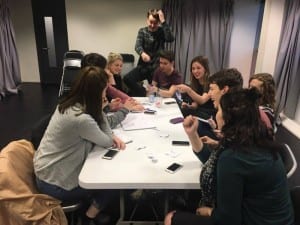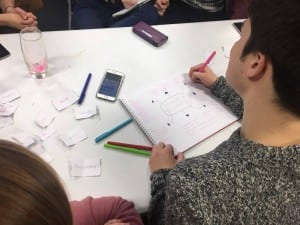As it got closer to the Theatre Company module, I realised the excitement I had for it. An excitement I had never really had before, especially when it came to theatre and this course. I struggled to put my finger on why this was.
After several meetings with my fellow company members, it dawned on me: the excitement was due to the fact that this group of people, which included me, had been given an amazing opportunity. An opportunity in which we could tackle any issue, present our unheard opinion on anything within this world or simply laugh at something that needed to be laughed at. The whole point is that we had been given an amazing opportunity and we needed to use it.
However, this realisation quickly turned the excitement into panic. This opportunity had two sides to it: the amazing chance to create our own, personal work but the other side to that, was what did we all believe in, as a theatre company. This lead to countless discussions on what we cared about and wanted to create content on, which, may I add, varied from raising awareness of illnesses to drag. This is where a personal admiration of my theatre company came from, and developed a notion that I desperately wanted to be seen in our material: the fact that this was a group of amazingly unique people, each with their own hates and loves, that had found themselves in Studio X on a cold Tuesday morning in January, trying to create a show.
Totally not posing so to seem like I was doing work. (Nixon, 2017)
From that point on, we all aimed to find a common thread throughout all of our interests, in which we could all connect and come together to create this show. This ideology has been there from the start, as shown by the fact that one of our first name ideas for the company, was Common Thread Theatre Company. Due to a theatre company already existing under this name, we had to [reluctantly] move on and I’m glad we did. Because if we had stayed with Common Thread, we wouldn’t have discovered a deeper meaning to this ideology of us being a group of people, brought together to create content.
This was where Fragment came into play. The concept that there are countless people, who feel dejected from society and rarely get their story told. That these people play second fiddle to the ‘bigger’ stories within the news, the ones of politicians and wars often seen on our screens. The concept that the human race has become the most fragmented it has ever been, with tensions and judgement at breaking point. This created the name of our theatre company, the manifesto and the saying that we aimed to follow throughout our creative process, We speak to: Someone. Anyone. Everyone.
Works Cited
Nixon, E. (2017) Fragment Theatre Company’s Gallery.


